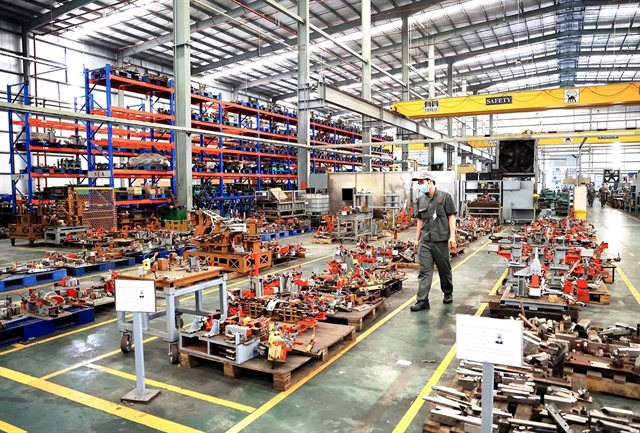 Economy
Economy

 |
| A component warehouse of a support company in Đồng Nai Province. The industry has around 5,000 companies up and running currently. — VNA/VNS Photo Hồng Đạt |
HÀ NỘI — Việt Nam's support industry has grown steadily over the past decade to around 5,000 companies, producing components for domestic demand and exports.
That remark was made by Phạm Tuấn Anh, Deputy Director General of Industry Agency, Ministry of Industry and Trade, at the workshop "Easing hurdles and boosting the resilience of the support industry" on Friday.
He said the companies spared no effort in capacity-building to move up the supply chain. Around 100 had become tier-1 vendors for multinational heavyweights, and 700 had established themselves as tier-2 and tier-3.
"Of the companies, Samsung has chosen about 50 as its tier-1 and 170 as tier-2," said Anh.
Their growing roles in the supply chain led to higher ratios of made-by-Vietnam components being used in assembly lines. For instance, the ratios have reached between 15 to 20 per cent in the mechanical engineering industry.
The deputy director also underlined several factors holding back companies. One centres around the fact that they remain trapped in low-value-added segments. Another involves the loosely-knit ties between the companies and foreign-invested ones.
He called for measures, such as capability-building programmes, to help them move up to high-value-added segments and cement ties with FDI companies.
Nguyễn Quốc Cường, Director of Hanel Plastics JSC, underlined four factors that are top of minds for global heavyweights when they pick their vendors: quality, price, delivery, and environmentally-friendliness.
"A company wouldn't be chosen as a vendor unless its products have an up-to-global-standards quality, competitive prices, efficient delivery, and no environmental impact," said Cường.
As consumers in the EU and the US have become more eco-conscious, his company is wasting no time in shifting to recyclable and environmentally friendly plastics to keep up with the times.
The director urged Vietnamese companies to invest more in technology to boost productivity and stay away from cheap labour. He said many countries out there also offer cheap labour, but only technology makes the difference.
Nguyễn Vân, Deputy Director of Hà Nội Supporting Industry Association, said his association had gone to great lengths to improve the capability of companies in the support industry.
It cooperated with Japanese and Korean counterparts in establishing consultant agencies, whose jobs involved helping the companies with consultation and training on obtaining globally-recognised certifications.
He also said Hà Nội had around 900 companies operating in the support industry currently and aimed to have 1,000 by 2025.
Đặng Trần Thùy, Director General of Kyoyo Vietnam Founding JSC, said his company was facing two difficulties amid the economic downturn.
The first involved input costs, which had climbed by about 30 per cent for some materials. The second centred around labour shortage, which had put it on tight spot since the COVID-19.
"We have to take on workers from distant provinces to take up the slack," said Thùy. — VNS




